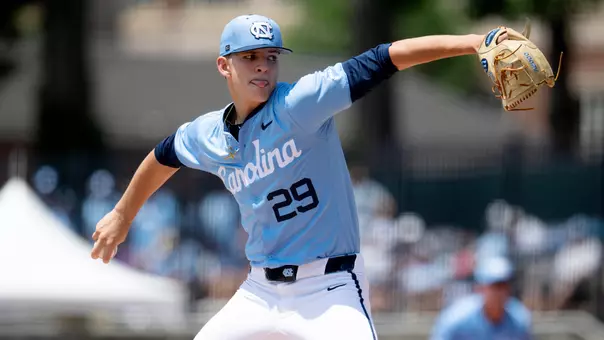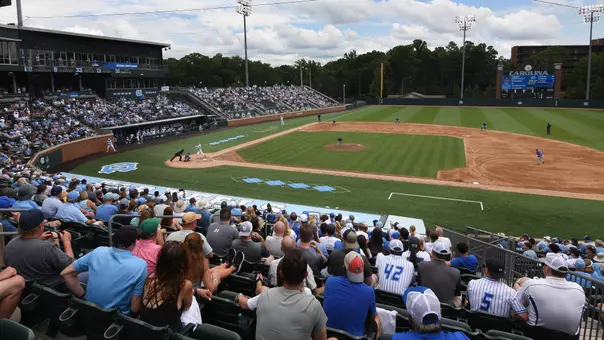University of North Carolina Athletics

Photo by: ANTHONY SORBELLINI
Lucas: A Baseball Town
June 8, 2025 | Baseball, Featured Writers, Adam Lucas
Over the last 20 years, Chapel Hill has shown signs of becoming something it once never was.
By Adam Lucas
They arrived early on Friday. With a 12 noon game, the first fans were in line before 8 a.m. They brought with them lawn chairs and fast food breakfasts and laptops to pretend to be in the office. These were the essentials for a day of waiting in line for standing room only tickets to game one of the super regional matching Carolina against Arizona.
Maybe that is when Chapel Hill became a baseball town.
In right field, beyond the fence, fans began setting up their chairs even earlier. They had to reserve a spot to peer through the wall like a member of the modern-day knothole gang. Just over their heads, the upper regions of Karen Shelton Stadium were filling with fans willing to bake in the sweltering temperatures to get a Wrigley rooftops-style view.
Right field is not for the sensitive. It's not ECU's Jungle, but it does have an edge. Fans have been known to read aloud from opposing right fielders' social media posts while that specific poster is playing right field, with particular highlighting of certain questionable decisions.
That creativity helps make Chapel Hill a baseball town.
We need to acknowledge right here near the beginning that Chapel Hill is not, inherently, a baseball town. We can be honest about ourselves, right? We can argue elsewhere about the cultural characteristics of what exactly makes a baseball town, but suffice it to say that Chapel Hill is not the type of town that supports a thriving Little League (the best players in town grow up playing in Durham or West Raleigh) or a summer league team or many of the other criteria you might otherwise associate with a baseball town. Tobacco in the fields and well-manicured, pristine youth parks. You get the picture.
So there has been a bit of a learning process over these last two decades of Tar Heel baseball growth. There is still some distance to go; the crowd in the main stands could be a little rowdier and a little more proactively disconcerting to the opponent. But consider how far we've come: the first year Carolina hosted a regional, in 2006, head coach Mike Fox had his pitchers—including future big leaguers Andrew Miller and Daniel Bard, plus the program's all-time wins leader, Robert Woodard—scrubbing the padding along the walls in the days before the games to gussy up the old stadium.
In 2025, Jake Knapp and Ryan Lynch don't scrub padding. We're making progress.
That 2006 Chapel Hill regional drew around 2,500 fans per game, and we boasted about that attendance figure. There had been a very real conversation about whether Chapel Hill could "support" a regional. Fox and others believed it could happen; his teams proved it.
The last 20 years have seen the growth of a niche UNC sport into part of the summer fabric of the town. Tens of millions of dollars in Boshamer renovations later, Sunday's attendance was over 4,000, with fans finding any possible space on the concourse or in the outfield to catch a glimpse of the game.
On Friday, students who were ostensibly logged in to online summer school classes stood in the shade to keep their phones from overheating and ensure they received credit for attendance even while getting their Diamond Heels fix. Tar Heels held up stuffed animals, beers, or small children when Kane Kepley came to bat. Former major leaguers like Alex White sat in the stands and current standouts from other sports like Alyssa Ustby stood on the concourse.
This was the only possible place to be for anyone who cares about Carolina athletics. At the end of the 1990's and start of this century, it felt like Carolina baseball was a very exclusive club with only a few members caring enough to participate. The last two decades have officially extended the Tar Heel sporting calendar from late March/early April through the end of June. This year saw more baseball season tickets sold than any year in history; with the premium on postseason access, next year is almost certain to eclipse that mark.
They are popular because they win and because they are identifiable. In an era when this can sometimes be hard to find, the way Carolina plays baseball under the Fox and Forbes regimes feels familiar. The first thing Forbes did in his press conference on Sunday was congratulate Arizona. He teared up only when talking about the players he wasn't able to provide with a trip to Omaha. The baseball team plays when most other sports are done, and casual fans quickly become attached because these guys just act like Tar Heels.
With the increased attention, of course, comes additional scrutiny on losses like Sunday's 4-3 defeat to Arizona. It had everything—big hits and missed opportunities and errors and pitching changes…all the debatable topics that make occasional score checkers into hardcore baseball fans. The game appeals to a certain element of craziness. Very rarely do you simply get physically overpowered in a baseball game. There is almost always a choice or a call or a play that could have gone a little differently, and that will stick with you much longer than the actual moment when it happens (just ask us about 2006 Oregon State).
You become a baseball town with games like this that give fuel for endless discussions all summer over breakfast at Sutton's or into the late evening at He's Not Here. Pull the pitcher or leave him in? Shift or play it straight up? Bunt or swing away?
Boston had Buckner and the collapse in the next game. Chicago had Bartman and the ensuing madness. Even in college, there are very few fan bases more fervent than Arkansas—this year the Razorbacks are searching for the program's first national title to wash away the pain of a missed popup in 2018.
Those are the games that all of us would handle perfectly if only we were given the chance, and for which only one individual actually bears responsibility.
That individual, of course, is Scott Forbes. In the wake of Sunday's loss, he pointed back to the Bible verse he writes on his game card: 1 Thessalonians 5:18—"Be thankful in all circumstances."
He is not thankful he and his team came up two runs short of a trip to the College World Series. He will miss eating a whiskey filet at the Drover. He wanted each of this year's players to experience the baseball nirvana that is June in Omaha.
But it doesn't say be thankful in the easy circumstances. And so he'll eventually navigate around the immediate heartbreak and be thankful this year's team was part of a bigger goal. Thankful for the goofballs in the dugout who made every practice fun, for the 46 wins and maybe even some of the 15 losses, for selling out Boshamer Stadium on seven different regular season dates plus the entire postseason.
And for playing a part in continuing the long process of making Chapel Hill a baseball town.
They arrived early on Friday. With a 12 noon game, the first fans were in line before 8 a.m. They brought with them lawn chairs and fast food breakfasts and laptops to pretend to be in the office. These were the essentials for a day of waiting in line for standing room only tickets to game one of the super regional matching Carolina against Arizona.
Maybe that is when Chapel Hill became a baseball town.
In right field, beyond the fence, fans began setting up their chairs even earlier. They had to reserve a spot to peer through the wall like a member of the modern-day knothole gang. Just over their heads, the upper regions of Karen Shelton Stadium were filling with fans willing to bake in the sweltering temperatures to get a Wrigley rooftops-style view.
Right field is not for the sensitive. It's not ECU's Jungle, but it does have an edge. Fans have been known to read aloud from opposing right fielders' social media posts while that specific poster is playing right field, with particular highlighting of certain questionable decisions.
That creativity helps make Chapel Hill a baseball town.
We need to acknowledge right here near the beginning that Chapel Hill is not, inherently, a baseball town. We can be honest about ourselves, right? We can argue elsewhere about the cultural characteristics of what exactly makes a baseball town, but suffice it to say that Chapel Hill is not the type of town that supports a thriving Little League (the best players in town grow up playing in Durham or West Raleigh) or a summer league team or many of the other criteria you might otherwise associate with a baseball town. Tobacco in the fields and well-manicured, pristine youth parks. You get the picture.
So there has been a bit of a learning process over these last two decades of Tar Heel baseball growth. There is still some distance to go; the crowd in the main stands could be a little rowdier and a little more proactively disconcerting to the opponent. But consider how far we've come: the first year Carolina hosted a regional, in 2006, head coach Mike Fox had his pitchers—including future big leaguers Andrew Miller and Daniel Bard, plus the program's all-time wins leader, Robert Woodard—scrubbing the padding along the walls in the days before the games to gussy up the old stadium.
In 2025, Jake Knapp and Ryan Lynch don't scrub padding. We're making progress.
That 2006 Chapel Hill regional drew around 2,500 fans per game, and we boasted about that attendance figure. There had been a very real conversation about whether Chapel Hill could "support" a regional. Fox and others believed it could happen; his teams proved it.
The last 20 years have seen the growth of a niche UNC sport into part of the summer fabric of the town. Tens of millions of dollars in Boshamer renovations later, Sunday's attendance was over 4,000, with fans finding any possible space on the concourse or in the outfield to catch a glimpse of the game.
On Friday, students who were ostensibly logged in to online summer school classes stood in the shade to keep their phones from overheating and ensure they received credit for attendance even while getting their Diamond Heels fix. Tar Heels held up stuffed animals, beers, or small children when Kane Kepley came to bat. Former major leaguers like Alex White sat in the stands and current standouts from other sports like Alyssa Ustby stood on the concourse.
This was the only possible place to be for anyone who cares about Carolina athletics. At the end of the 1990's and start of this century, it felt like Carolina baseball was a very exclusive club with only a few members caring enough to participate. The last two decades have officially extended the Tar Heel sporting calendar from late March/early April through the end of June. This year saw more baseball season tickets sold than any year in history; with the premium on postseason access, next year is almost certain to eclipse that mark.
They are popular because they win and because they are identifiable. In an era when this can sometimes be hard to find, the way Carolina plays baseball under the Fox and Forbes regimes feels familiar. The first thing Forbes did in his press conference on Sunday was congratulate Arizona. He teared up only when talking about the players he wasn't able to provide with a trip to Omaha. The baseball team plays when most other sports are done, and casual fans quickly become attached because these guys just act like Tar Heels.
With the increased attention, of course, comes additional scrutiny on losses like Sunday's 4-3 defeat to Arizona. It had everything—big hits and missed opportunities and errors and pitching changes…all the debatable topics that make occasional score checkers into hardcore baseball fans. The game appeals to a certain element of craziness. Very rarely do you simply get physically overpowered in a baseball game. There is almost always a choice or a call or a play that could have gone a little differently, and that will stick with you much longer than the actual moment when it happens (just ask us about 2006 Oregon State).
You become a baseball town with games like this that give fuel for endless discussions all summer over breakfast at Sutton's or into the late evening at He's Not Here. Pull the pitcher or leave him in? Shift or play it straight up? Bunt or swing away?
Boston had Buckner and the collapse in the next game. Chicago had Bartman and the ensuing madness. Even in college, there are very few fan bases more fervent than Arkansas—this year the Razorbacks are searching for the program's first national title to wash away the pain of a missed popup in 2018.
Those are the games that all of us would handle perfectly if only we were given the chance, and for which only one individual actually bears responsibility.
That individual, of course, is Scott Forbes. In the wake of Sunday's loss, he pointed back to the Bible verse he writes on his game card: 1 Thessalonians 5:18—"Be thankful in all circumstances."
He is not thankful he and his team came up two runs short of a trip to the College World Series. He will miss eating a whiskey filet at the Drover. He wanted each of this year's players to experience the baseball nirvana that is June in Omaha.
But it doesn't say be thankful in the easy circumstances. And so he'll eventually navigate around the immediate heartbreak and be thankful this year's team was part of a bigger goal. Thankful for the goofballs in the dugout who made every practice fun, for the 46 wins and maybe even some of the 15 losses, for selling out Boshamer Stadium on seven different regular season dates plus the entire postseason.
And for playing a part in continuing the long process of making Chapel Hill a baseball town.
Players Mentioned
WBB: Post-Duke Conference - Feb. 15, 2026
Sunday, February 15
UNC Women's Basketball: Tar Heels Fall at Duke, 72-68
Sunday, February 15
UNC Men's Lacrosse: Tar Heels Cruise Past Iona, 23-7
Sunday, February 15
UNC Baseball: Winslow Walks-Off Heels to Sweep Series vs Indiana
Sunday, February 15













